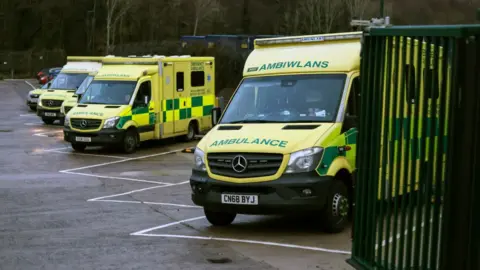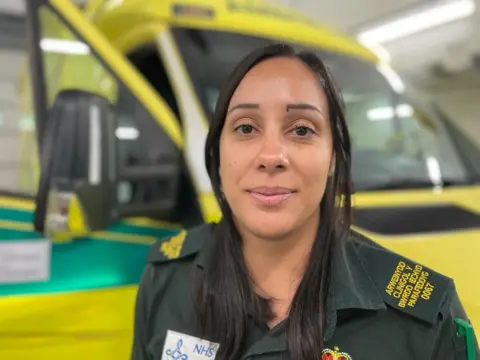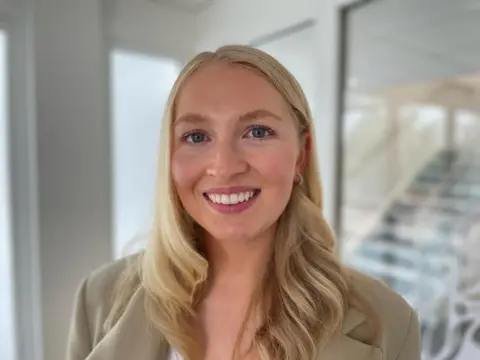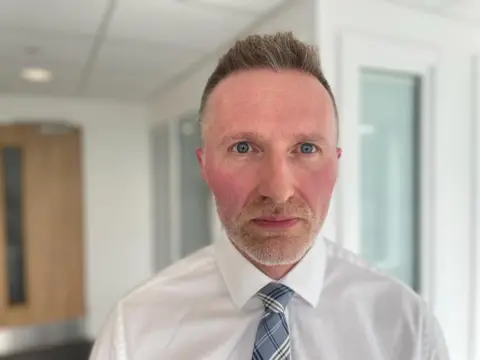Misogyny: Welsh paramedics share sexual harassment experiences
 Getty Images
Getty ImagesA female paramedic has said she "expects to be sexualised" by her colleagues when she goes to work.
Victoria, not her real name, said she feared her career prospects could be ruined by speaking about the culture at the Welsh Ambulance Service.
She is one of three ambulance workers who have spoken to BBC Wales as the service aims to tackle misogyny and sexual harassment head on.
The ambulance service has supported the women in sharing their stories.
It carried out its own audit and staff surveys after damning reports into other uniformed services such as the Metropolitan Police, fire service and armed forces.
The results made for uncomfortable, but unsurprising, reading.
Each of the women made it clear that they work with incredible colleagues - they do not feel "all men are bad" - and there was a feeling that management is now taking the problem seriously.
Victoria said it was a "weird revelation" that she was seen as something to be objectified by colleagues rather than as a paramedic.
She said she had been warned about several colleagues and told she should be careful about how she acted around them.
But on the occasions she made it clear approaches were unwanted or inappropriate, some simply "doubled down".
"They said 'if I work hard enough on you, you'll cave eventually'. And these comments were made out in the open," she said.
"They're not said behind closed doors because they're so unafraid of consequence."
Victoria said the responsibility to prevent this kind of behaviour was usually on the victim.
She said she had taken on more laddish behaviour in order to be perceived as less feminine to be objectified less.
But she also feared she would be ruining her own career prospects by speaking about it, and would be known "as the one that tried to get rid of banter".
She said it "feels like you are at the hands of a game when you're on the road or in a crew room with three other men who you do not feel safe with, because they're making comments that you feel obliged to go along with, for the sake of keeping yourself safe".
"It can be quite a scary place to be.
"I'll make sure that I'm not on my own with specific male colleagues - I realise how terrifying that sounds.
"We've got a lot of young female colleagues coming in and they shouldn't have to make those sacrifices in their working day.
"They shouldn't have to be making those adjustments just to keep themselves safe, psychologically and physically, in the workplace."

Tamara Williams, health board clinical lead for the Welsh Ambulance Trust, said she also experienced unwanted attention when she started with the service 12 years ago.
She said: "Despite being clear how I felt, that escalated over time to a place where I began to feel very uncomfortable about coming to work.
"I was fearful of what might happen when I did come to work.
"It's hard enough trying to work out whether it's your behaviour that's attracted this attention."
She said she was worried if she would be believed and supported if she reported the harassment - and would still have been working alongside friends of the individual.
She said she "downplayed" the way it made her feel, and though dark humour is used as a coping mechanism, adding: "It's important we distinguish the difference between a joke and being made to feel unsafe."
She is part of the Voices Network that has been established, which provides a platform for people to share their harassment experiences.
"What was the most surprising thing for me was the huge numbers of people who have come forward. We thought it might be rare - it's much more common than we realised."
She said she still feels an internal conflict about how she would be perceived in calling out inappropriate behaviour - whether colleagues would no longer include her in office conversations and banter.
"But the need for this to be talked about is far greater than my concern about how I'm being perceived."

Bron Biddle, who has been leading the work for the Welsh Ambulance Service, said: "Accepting the problem in its entirety, no matter how uncomfortable that might feel, is the starting point for change.
"Workplaces will always reflect society and sadly this is a much broader problem. I wasn't surprised by what I heard, but was taken back by the scale of it."
As chief executive of the service in Wales, Jason Killens said the results of the survey, and "reverse mentoring" sessions with colleagues who have lived-experience of harassment revealed "deeply uncomfortable things".
"I don't think I'd fully grasped how isolating it is for individuals when they are subject to this inappropriate behaviour in the workplace."
He added it also highlighted his own "white, male privilege" and "what I now need to do to help people feel safe at work".
He acknowledged revealing this work could be reputationally damaging for the service, but the culture needed to be confronted.

He said he would have favoured rooting out perpetrators and parting ways 18 months ago, but now the aim was to change the way people think and behave in the workplace.
Where disciplinary action is required, it will be taken, but Ms Biddle said the language used by other organisations around "stamping it out" or "zero tolerance" does not work as it fails to change the culture and empower people to come forward with complaints.
"There's a cycle you see with sexual harassment of, 'if I point out the problem I become the problem'.
"We have a really strong sense of belonging and identity in our organisation - we all want to fit in, of course we do, but we may be missing what's becoming so normal that unfortunately is escalating to examples of behaviour we don't want to be happening."
